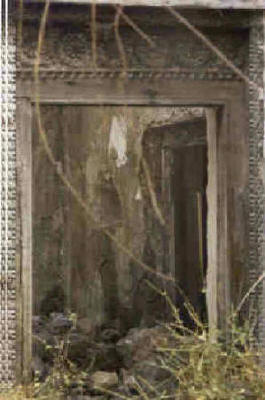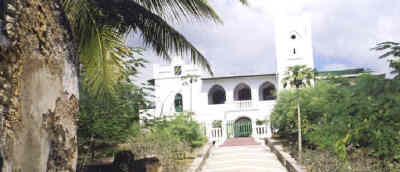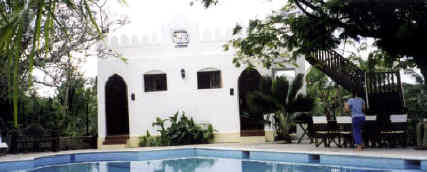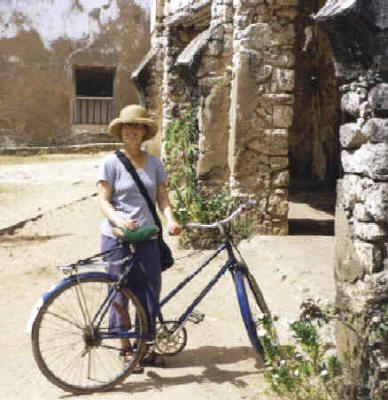
Not too far from Mtwara is a small town called Mikandani, which had been a major port from the late 15th century until the ban on the slave trade in the 19th century. Now it is a sleepy coastal town with some beautiful but deteriorating examples of Swahili architecture. We had read in that it was possible to rent bicycles by the market in Mtwara, and, having spent three long days sitting on our butts, we were excited about the prospect of a little bit of exercise. We set off for the market intent on riding bikes to Mikandani. Of course, we find that there is, in fact, no bike rental shop in all of Mtwara. As we're contemplating what to do, we're approached by some guys asking whether we need transport to the Mozambique border. We tell them that we don't, but that we really want to ride bikes to Mikandani. After some negotiation, they find three bikes for us. The bikes are all one speed, have semi-bald tires, and have only rear brakes that work, but we get them for about $2 apiece for the afternoon. We're off.
|
|
 |
|
|
|
At first, we're a little wobbly, especially on the dirt road, but once we hit the tarmac, the bikes are surprisingly stable. Although we get many strange looks from local people, the six mile ride along the coast is extremely pleasant. We spend a little time looking around town and the market, but end up spend most of our time hanging out with the local kids who are amazed to see a photo of their little town in the Lonely Planet.

Click here to see more photos of the children in Mikandani.
On the way back to Mtwara, we stop at The Old Boma at Mikandi, an old German administrative building that has been converted into a beautiful hotel. We buy a couple of orange juices and one incredibly overpriced sandwich for the privilege of spending several hours with our feet in pool. A very worthwhile expenditure.
|
|
 |
|
 |
We made it back to Mtwara, returned the bikes to their owners, and had an excellent curry lunch at Masumeen. After a shower (actually, a bucket bath, but after the ride, cool water feels good) and a nap, Randy and Steve head out for a beer. I, on the other hand, could not stand the idea of getting sweaty again, and refused to move off the bed. The guys get into a conversation with the owner of the bar and some local guys, and for some reason, they ask to see our tickets for the boat the next day. While we had thought that the boat would depart at 8:00 p.m (because it said 8:00 p.m. on our ticket), we were wrong. Our boat was going to leave at 2:00 in the afternoon. The time on our ticket was "Swahili time," not "Western time." They learned that in Swahili time, the day starts at sunrise (makes sense), which, at the equator does not change substantially during the year, so what we think of as 6:00 a.m. is considered 1:00 a.m. in Swahili time. To make matters even more confusing (at least for us), the people here keep their watches on Western time, but convert to Swahili time. So much for our mastery of Swahili.
High points of the day: The kids and the swimming pool at the Old Boma


